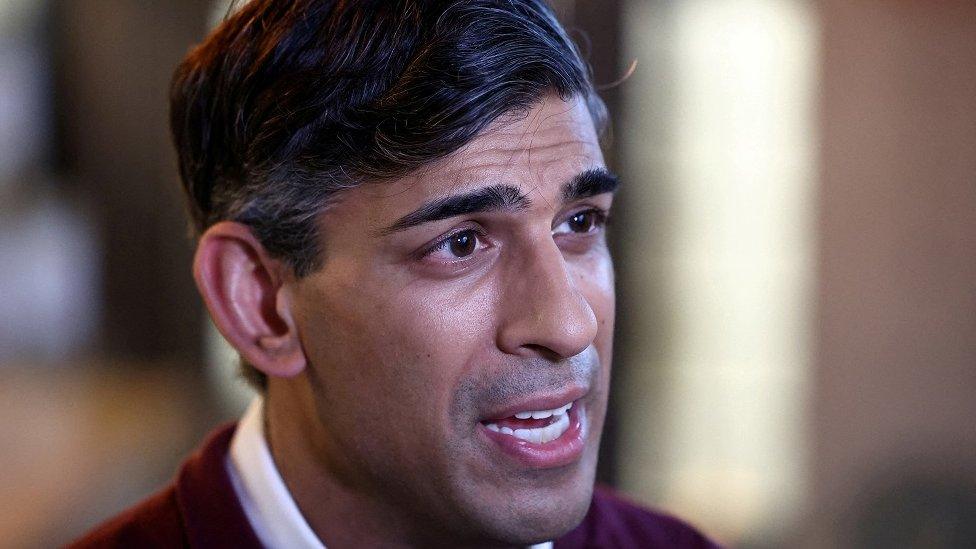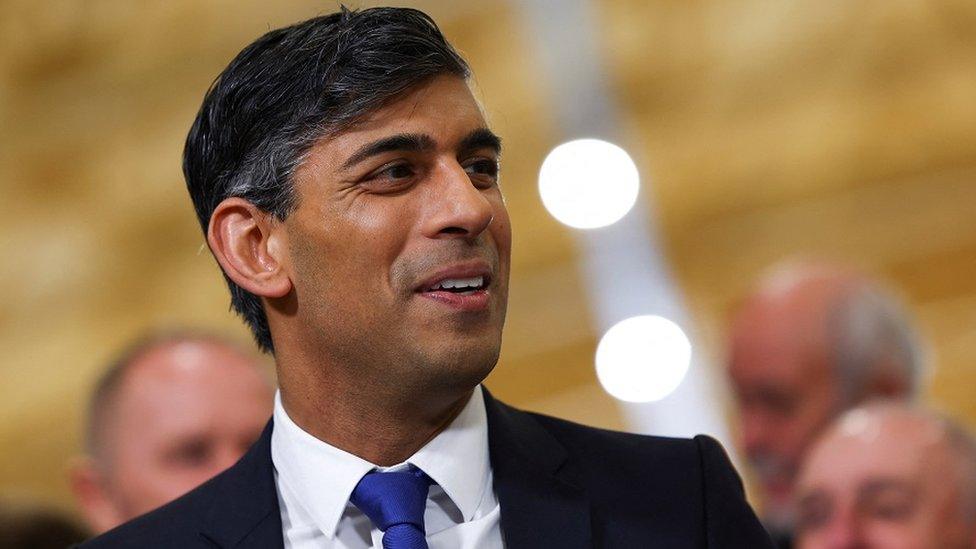Rishi Sunak attacks Keir Starmer over defence as election battle lines drawn
- Published
People in Britain need to know there is a "secure future for them" the PM tells the BBC's political editor
Keir Starmer would make the UK less safe, Rishi Sunak has claimed in a wide-ranging speech which previewed issues likely to come up in the election expected this year.
The PM said Labour would not match his pledges on defence including a commitment to boost defence spending to 2.5% of national income by 2030.
Labour has said it would meet the same target when conditions allow.
Asked about the remarks, Sir Keir said security would be his "first priority".
He accused the Conservatives of "hollowing out" the armed forces and "wasting billions of pounds on procurement", adding that voters at the next election faced a choice between Labour "or continuing with this government of chaos and division".
The government has said it would meet its 2.5% pledge by shrinking the size of the civil service.
Think tanks including the Royal Untied Services Institute and the Institute for Fiscal Studies have said the extra spending would also have to come from cuts to other departments.
The Conservatives are currently behind Labour in the polls and Mr Sunak faces an uphill struggle to turn things around before the next general election.
In his 30 minute speech - which sounded like the opening salvo in an election campaign and included a personal attack on the Labour leader - Mr Sunak described a future that was both a time of danger but also of transformation.
He warned of threats from an "axis of authoritarian powers" such as Russia, Iran, North Korea and China and spoke of the challenges to cyber security.
However, he also argued there were reasons for optimism citing the potential of artificial intelligence to improve education and health.
In contrast to his conference speech last autumn, which had the theme of change, he also sought to defend the Conservatives' time in government, while attempting to personify the future.
He admitted that the party's record was not "perfect" and that he understood some people felt their "confidence and pride" in the country had been "knocked".
"I understand that, I accept it, I want to change it," he said.
"What I cannot accept is Labour saying all the worries you have are because of 14 years of Conservative government, that all you need to do is change the people in office and all these problems will magically disappear."
He argued that in difficult circumstances - including economic shocks and the Covid pandemic - the Conservatives had delivered in a number of areas such as restoring financial security, delivering Covid vaccines, reforming welfare and legalising equal marriage.
He accused Labour of trying to "depress their way to victory".
He also sought to define himself as a man of conviction in contrast to Sir Keir, who he said was "trying to be everything to everyone".
Referencing last week's defection he said the Labour leader had gone from "embracing Jeremy Corbyn to embracing Natalie Elphicke".
He added that when challenging for the Conservative leadership in 2022 he had opposed Liz Truss's policies "that imperilled our financial stability".
"I was sooner prepared to lose than abandon what I believe so deeply is right for our country."
Asked if he believed the Labour leader would make the country more unsafe, Mr Sunak said: "We will keep this country safe and Keir Starmer's actions demonstrate he won't be able to do that."
He argued Labour had been "crystal clear" they would not match his pledge to increase defence spending to 2.5% by 2030.
Sir Keir Starmer told reporters that Mr Sunak's speech was his "seventh reset in 18 months".
Speaking as he met newly-elected Labour mayors in the West Midlands, he said the choice going into the election was "between a changed Labour Party that puts the country first and party second or continuing with this government of chaos and division".
"We would not be less safe under a Labour government" - Keir Starmer
"The first duty of any government is national security. That will be my first priority," he said.
"This government talks about national security but what is its record - it has hollowed out our armed forces, wasted billions of pounds on procurement and doesn't have a credible plan for the future.
"We are much more serious than that."
Related topics
- Published13 May 2024

- Published6 May 2024
